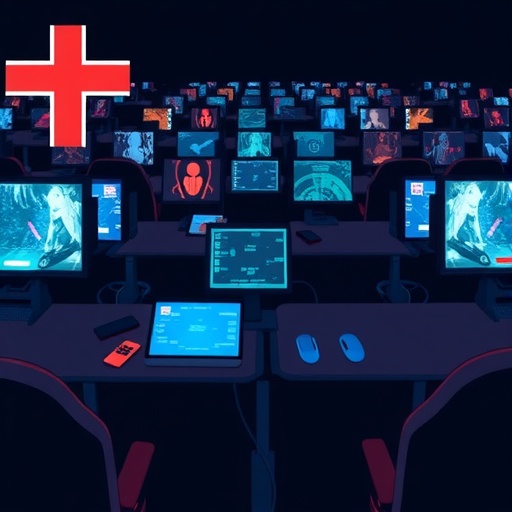In a groundbreaking study conducted among Georgian university students, researchers explored the intricate relationship between gaming, religiosity, and mental health. The original premise rests on the observation that gaming has rapidly become a dominant form of leisure among youth, coexisting with various societal changes, including shifts in religious engagement and mental health awareness. The aim was to decode how these factors interact and influence each other, particularly in a culture deeply rooted in tradition yet increasingly dominated by modern digital influences.
The study, spearheaded by Chakhunashvili and colleagues, utilized a comprehensive survey methodology, which encompassed a diverse demographic of Georgian students. Given that Georgia has a rich tapestry of cultural and religious heritage, the research delves into how such factors coexist with the booming gaming culture. By probing deeper into this dynamic, the researchers aimed to shed light on broader societal implications and the potential psychological effects stemming from each variable.
Gaming, often seen as a mere pastime, serves multiple functions in contemporary society, ranging from stress relief to social interaction. It enriches the lives of many, providing an avenue for escape and connection in an increasingly fragmented world. Yet, concerns have emerged regarding excessive gaming and its potential association with negative mental health outcomes. This research specifically examines the threshold at which gaming transitions from a healthy activity to a hazardous one, especially within the student population, who may be more vulnerable to the pressures of academic and social life.
On the flip side, religiosity plays a crucial role in the mental framework of young people. In many cultures, religious beliefs offer comfort, guidance, and community, aiding individuals in navigating life’s challenges. The juxtaposition of strong religious beliefs with gaming, a frequently secular endeavor, raises compelling questions about cognitive dissonance and the psychological adjustment that students must navigate. This study aims to decode these complex interactions, ultimately fostering a better understanding of their mental health implications.
Preliminary findings from the survey underscored the divergent pathways that students may experience between gaming and religiosity. Researchers identified that while moderate gaming could serve as a stress-relief mechanism, excessive engagement frequently unearths emotional distress and loneliness. On the other hand, students who reported higher levels of engagement in religious activities often exhibited more robust mental health profiles. This intersection of gaming and religious involvement revealed a nuanced landscape where individuals might seek solace from stress through two distinctly different modalities—virtual escapism versus spiritual engagement.
Furthermore, this study factored in the demographics of the participants, revealing variances based on gender, age, and socio-economic status. For example, female participants reported higher levels of anxiety associated with gaming as opposed to their male counterparts. Meanwhile, male students often perceived gaming as a community-building tool that could enhance their social interactions. This differential impact indicates that one-size-fits-all solutions are inadequate when addressing mental health issues related to gaming among students.
As the researchers continue to analyze the data from their extensive survey, they are employing advanced statistical methodologies to draw correlations between gaming behaviors and mental health indicators. Such rigorous examination is expected to produce insights that could inform both academic policies and mental health interventions tailored specifically for this demographic, which often remains overlooked in broader discussions on digital media’s impact.
Moreover, this research holds significant implications for educational institutions and policymakers. Understanding the dual roles of gaming and religiosity could catalyze the development of targeted support systems that promote healthier lifestyles among students. By fostering environments that encourage balanced gaming habits alongside spiritual engagement, universities could enhance students’ overall well-being, thus ensuring more resilient future generations.
The broader societal context also plays a pivotal role in shaping the findings of this study. Georgia’s evolving cultural landscape, where traditional values intersect with modern challenges, exemplifies the complexities facing young people today. The study underscores that addressing mental health requires a multifaceted approach that transcends simplistic narratives and embraces the interconnectedness of various life domains.
In conclusion, the research into gaming, religiosity, and mental health among Georgian students sheds light on the intricate pathways that influence young minds today. By intertwining these crucial aspects, the study opens the door to profound revelations that could reshape mental health interventions and promote holistic strategies to foster resilience among students. The potential for a more integrated approach highlights a promising frontier in psychological research, encouraging future studies to explore these dynamics in greater depth and across various cultural contexts.
This pioneering research exemplifies how understanding the nexus of technology and spirituality can illuminate broader societal challenges and encourage innovative solutions grounded in empirical evidence. As society continues to evolve, embracing both traditional wisdom and modern approaches becomes essential in fostering mental health and well-being among the youth.
The ongoing dialogue around gaming’s impact, complemented by traditional values, presents a unique opportunity to rethink strategies for mental health support in educational settings. As the world continues to embrace digital innovations, it becomes increasingly important to strike a balance that honors both the benefits of technology and the timeless resources of spirituality and community.
Subject of Research: The interplay between gaming, religiosity, and mental health among Georgian university students.
Article Title: Gaming, religiosity and mental health among Georgian students.
Article References:
Chakhunashvili, K., Chakhunashvili, D.G., Patil, R.R. et al. Gaming, religiosity and mental health among Georgian students.
Discov Ment Health 5, 157 (2025). https://doi.org/10.1007/s44192-025-00297-0
Image Credits: AI Generated
DOI:
Keywords:




